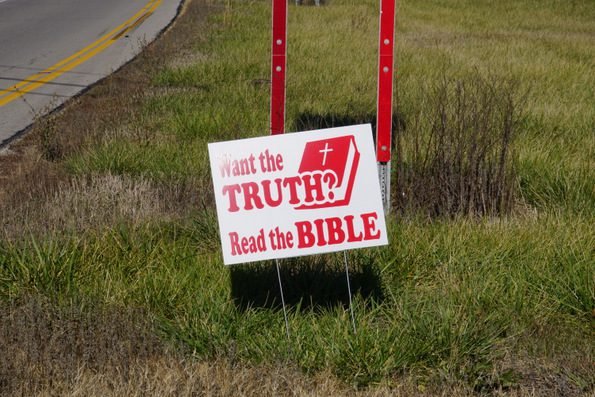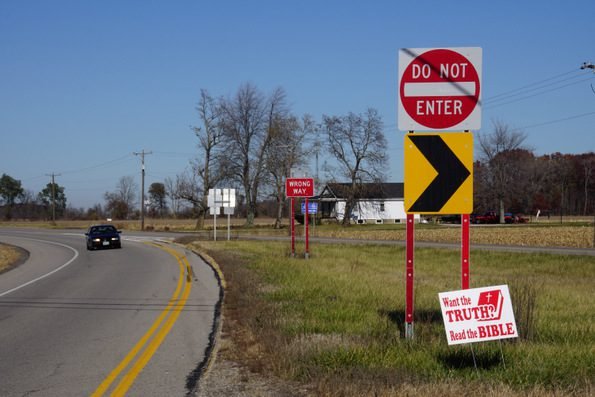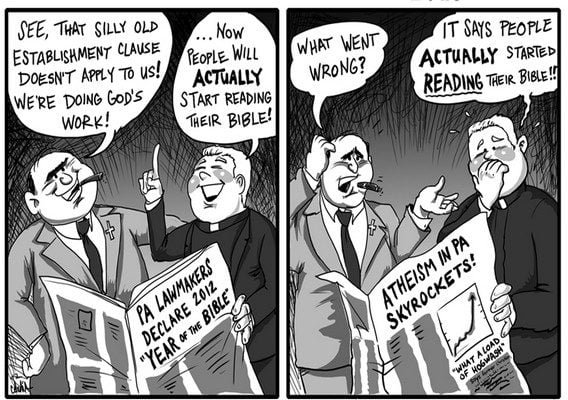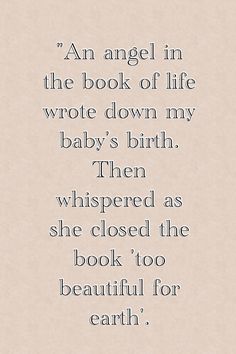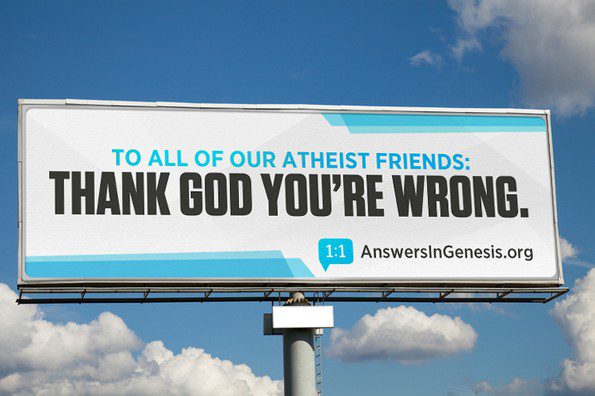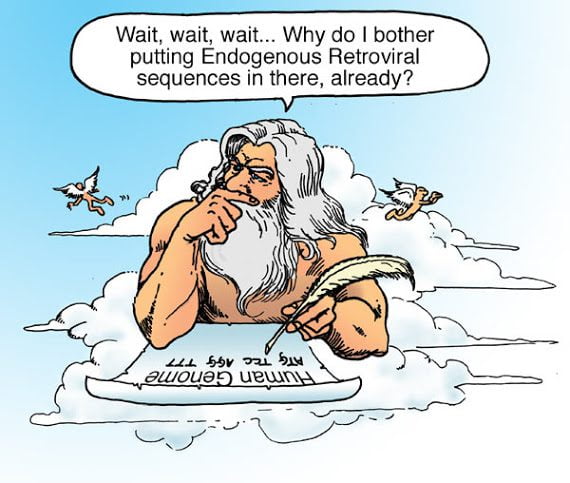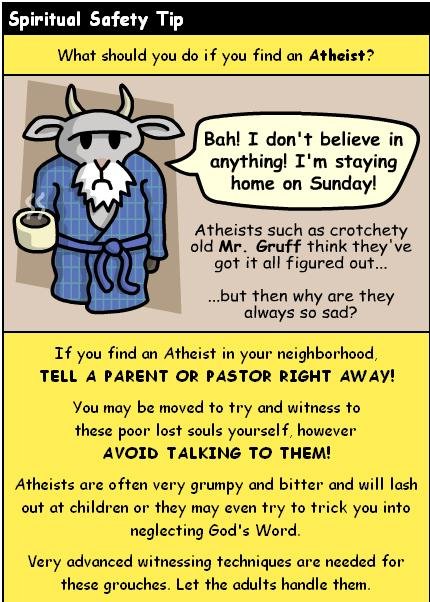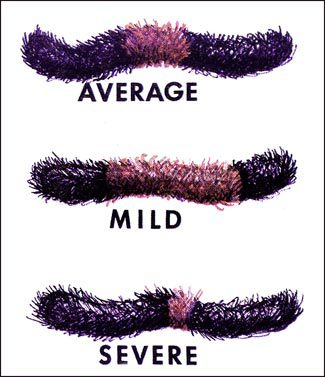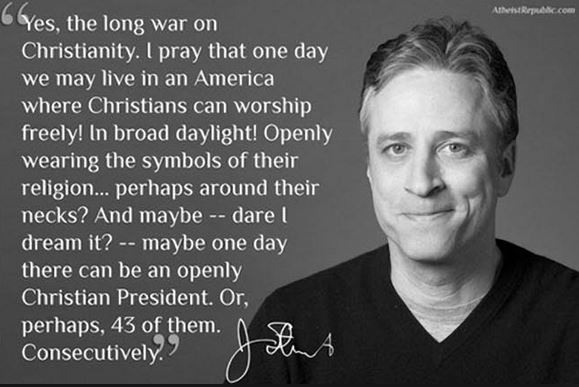
As a child growing up in the late 1950s and 1960s, I frequently watched the daytime TV show, Art Linkletter’s House Party. One feature of House Party was a segment called Kids Say the Darnedest Things. Linkletter would interview children between the ages of five and ten, and their responses were quite funny and entertaining. According to Wikipedia, Linkletter interviewed an estimated 23,000 children.
Yesterday, Erin Davis, a writer for the Lies Women Believe website, wrote a post titled, When it is Hard to be a Christian at School. According to Davis, Evangelical students who attend public schools are facing challenges to their Christian faith and practice. It’s not easy to be a Christian, Davis says, and she is quite proud of the fact that there are Christian students who are willing to stand up for their faith. Davis, and Lies Women Believe, are starting a new website feature to help students boldly stand up for Jesus and Christianity. Called Stand for Truth Thursdays, Davis and her fellow Evangelical truth-tellers hope to “each Thursday…feature a post on how you can stand firm in your faith no matter where you go to school.”
In her article, Davis made an astounding statement that got me thinking about Art Linkletter and Kids Say the Darnedest Things. As I read Davis’s statement, I thought, I should start a TV show called, Evangelicals Says the Darnedest Things. Here’s what she had to say:
Being a Christian has always been a risky choice.
Really? In what way, in America, is being a Christian a risky choice?
Let’s see. The United States has a constitution and bill of rights that expressly grant every citizen the freedom of speech and religion. The establishment clause forbids the government from meddling in the affairs of religious organizations. There’s a wall of separation between church and state that’s meant to protect religious institutions from government encroachment and any attempt to limit the free exercise of religion. Churches are tax exempt and members of the clergy have special tax breaks that allow them to pay very little income tax. Ministers are even permitted to opt out of social security if they so desire.
Any group of U.S. citizens can start their own religion or start a church, and any individual can decide he or she wants to be a minister. I could decide today to start a new church, say First Church of Bruce Almighty, and by Sunday I could have a congregation gathered up and be holding services. Donations to my new church would be, by default, tax exempt, and here in Ohio my new church would be exempt from sales and real estate tax. There’s no government oversight about what is considered a real church, and the IRS goes out of its way to be vague about the definition of a church.
Every community in America has one or more Christian churches. There are six churches within 5 miles of the town I live in and almost 200 Christian churches within a 30 mile radius. Whatever flavor of Christian that people want to be, there’s a church for them. Groups like Youth for Christ, Child Evangelism Fellowship, and Fellowship of Christian Athletes have ready access to public school students. Churches are free to start private religious schools, often with little or no government oversight. Evangelical parents are permitted to pull their children out of the public school and educate them at home. If parents wants to teach their child the earth is 6,020 years old and evolution is a lie, they are free to do so. Pastors routinely open or close government meetings with a prayer. Everywhere I look, Christianity is on display. Where’s this risky Christianity Davis talks about?
Almost eight out of ten Americans profess to be Christian. Most Evangelical children have Evangelical parents who, from their earliest years forward, take them to a nearby Evangelical church. Evangelical children are encouraged to make a public profession of faith in Jesus as soon as they can understand the notion of sin and their need of forgiveness and salvation. Evangelical children make this profession of faith surrounded by other Evangelical children. From walking the aisle and getting saved to getting baptized by immersion, the new Christian is surrounded by like-minded Evangelicals. Many Evangelicals call getting baptized a public profession of faith, yet the crowd watching the baptism are those who have already gone through the baptism ritual themselves. Getting saved and baptized in an Evangelical church is one of the safest, most non-stressful things a person can do. Risky? Not a chance.
Evangelicalism has its own subculture with Christianized music, entertainment, clothing, toys, books, and food. Evangelicals start businesses and local Christians are encouraged to support their fellow Christian’s business endeavor. The ichthys symbol is prominently displayed on business signs and advertisements, reminding Christians that a fellow club member runs the business. If Evangelicals are so inclined, they could wall themselves completely off from the wicked world of unwashed, uncircumcised Philistines and Canaanites and only breathe in the pure, righteous, holy air of Evangelical Christianity.
So, when someone like Erin Davis says that being a Christian is a risky choice, I ask, how so? I can’t think of one way that being a Christian in the United States is risky. Evangelicals pay no price for their faith. They are free to live, work, and play without being molested by the government or those opposed to Christianity. Evangelicals are as free as a nudist running down a beach on a warm summer day. Unencumbered by law or opinion, Evangelicals are free to be whatever it is they want to be. If this is so, and certainly Davis should know it is, why would an Evangelical like Davis say being a Christian is risky?
Thanks to Madalyn Murray O’Hair, atheism and unbelief have been part of American life since the 1960’s. Numerous groups like American Atheists, American Humanist Association, Freedom From Religion Foundation, The Clergy Project, and Center for Inquiry now promote atheism, agnosticism, and humanism. Authors like Bart Ehrman, Sam Harris, Richard Dawkins, and the late Christopher Hitchens write bestselling books that critique and attack Christian belief. Numerous blogs and websites are now devoted to atheism and critiquing Christian belief. Recent polls show that young adults are abandoning religion at a record pace, and there is an increasing number of disaffected Evangelicals leaving Christianity. Some leave Evangelicalism and join up with liberal or progressive Christian sects; others seek out eastern religions or abandon Christianity altogether.
It is the rise of secularism and atheism, along with the indifference of younger adults towards religion, that leads people like Erin Davis to conclude that Christianity is under attack and that it is now risky to be a Christian. Some Evangelical talking heads even say that American Christians are now be persecuted for their faith. Why, just a few months ago poor Kim Davis was thrown in jail for her faith, right? No, actually she wasn’t. She was jailed because she refused to obey the law and fulfill her duty an elected government official. While there are certainly individual cases where one could conclude that a Christian is being persecuted, most claims of persecution are really just examples of childish Christians throwing a temper tantrum over not being allowed to violate the law or get their way. They rightly recognize that they are losing their preferred seat tat the head of the cultural table, and this frightens and upsets them. It also causes them to see persecution and hardship where there is none.
Let me end this post with Erin Davis’s own words and the words of several commenters about what they consider the risk of being a Christian. I’ll leave it to readers to judge whether they have a point. Davis wrote:
A college freshman at Duke University made national headlines for refusing to participate in a class assignment that required him to read a sexually-explicit graphic novel.
The fictional plot for the blockbuster hit movie God’s Not Dead was ripped from actual First Amendment court cases. The makers of the movie cite forty real-life court battles in which “university students, campus ministries, and clubs [were] attacked for their biblical faith.”
Being a Christian has always been a risky choice. That’s as true today as it was way back when Eve decided to fall for Satan’s lie instead of standing on God’s truth.
A group of Christian students in Pennsylvania organized a “flannel day” to show unity against increased LGBT activity at their school. Their peaceful protest involved putting Bible verses on plain pieces of paper underneath LGBT Awareness Day posters around their school. Similarly in my own home state of Missouri, more than 150 students walked out of their high school in protest of a transgender male being allowed to use the girls’ locker room.
And here’s what several commenters had to say:
…My afternoon at school today consisted to yoga in phys ed followed by a less on eveloutuon (sic) and why they bible is wrong in biology. It was horrible and I have just been praying for guidance because apparently I’m getting yoga and eveloution (sic) every Thursday for a month but I really truly need a way to stand firm…
…I mean this same day in my Christian school I was mocked for doing the right thing and I felt sad but this encouraged me so much…
…I’m in college and we’re working on a group project, which needs a song. With regards to choosing the song, I don’t want to do something of pop culture or past pop culture because it troubles my spirit. At the same time, there’s just about no songs out there that have to do with our topic that’s not influenced by single-person center stage stars unless we do a hymn or a Christian song, which I am not sure that they will approve of. It has to do about not being good enough…
I feel very conflicted when it comes to the topic of lgbtq. I am a Christian yet I was raised in a public school system where it’s very politically correct and relativism and all that. I am confused as to how I should stand up for God in this matter especially as I am aspiring to be a nurse. Right now I believe that I cannot judge the LGBTQ community. That I should love them as myself. That if they ask if gay people can go to heaven, I don’t know. It’s a matter of your relationship with God and that relationship with cost you to surrender your life to Him. Would you be willing to surrender all to Him? Even if you find out that He does not want men to have sexual relations with men and vice versa. So reading this post I am just confused and conflicted with the protest against the transgendered male. I am not against posting verses under the posters but yeah. I just have a lot of mixed opinions about this issue and especially as I need to give equal care to those who don’t know God. I don’t know how I can evangelize in that profession and stand up for my faith properly…


